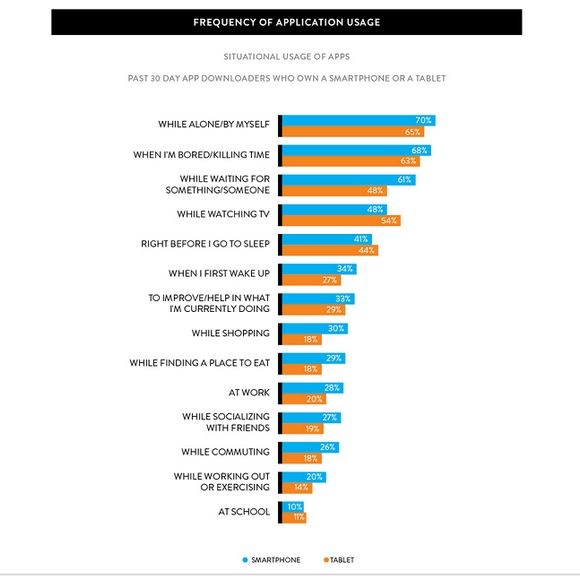It’s interesting how some applications work. They’re there to provide a service to consumers, but, in a surprising twist, many downloaders actually keep the apps on their devices without actually using them. That’s according to Nielsen research numbers.
The study, posted on Clickz, indicates that around 42 apps are available on an average smartphone device, downloaded by the user. However, out of the 3,700+ users that were polled for both smartphone and tablet usage over a 30-day period, 84 percent actually use less than 10 of these apps on a daily basis, while 55 percent stated that they only use between one and four on a daily basis.

In addition, paid apps aren’t nearly as popular as unpaid ones, as 47 percent of those polled indicated that they wouldn’t pay for social networking, discounting or coupon services, or any sort of payment-related programs.
Ben Leventhal, a co-founder and chief executive officer for restaurant reservation app Resy, explained that apps need to offer something unique and valuable for consumers to use them more often. “The only apps I use are the ones that feel like magic, whether that means getting me a car or an impossible restaurant reservation in 30 seconds or allowing me to watch a news event halfway around the world in real time,” he explained. “The apps that stay on my home screen are either profoundly useful or help me connect with the world.”
Leventhal also showed concern that a great number of these apps don’t show significant value. “Every app promises to do something amazing and show us the future, which sounds great,” he said. “But most are over-promising by a mile, so they disappoint us, and we forget about them.”
Meanwhile, Jason Levy, senior vice president of engagement strategy and innovation at Saatchi & Saatchi Wellness, expressed that “bad apps” aren’t helping the matter. “People are just making bad apps that just aren’t necessary or apps that are better served as a mobile website,” Levy says.
Such items, like a car’s instruction manual, wouldn’t exactly make for a “must-store” app on a phone, although Levy believes it can find value as a mobile site. “So rarely is that information needed that it’s just going to sit on a way back page if it doesn’t get deleted. Meanwhile if [the owner’s manual] is online for the very rare instance you need it, the information would make a lot of sense as a mobile website.
However, when it comes to building proper apps, Levy believes that it should be done the right way, and not necessarily a gimmick that tries to rip off, for instance, Angry Birds. “If you’re a consumer packaged good, and you’re trying to come up with a time-killing app, you’re going up against people whose core business and the way they’ve monetized themselves is creating time-killers, and you’re going to get crushed,” says Levy.

